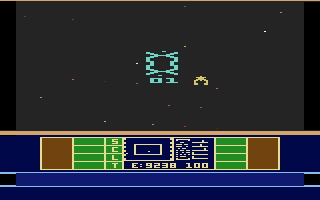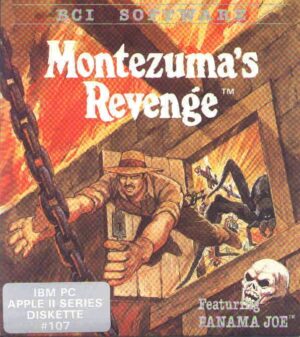Retro Replay Review
Gameplay
Phaser Patrol offers a dynamic blend of strategic planning and high-octane space combat. At its core, the game revolves around navigating a sector map to identify and eliminate Dracon armadas scattered across the galaxy. You start each mission by scanning the map, plotting warp coordinates, and calculating energy reserves. This initial phase demands careful resource management—each warp jump and enemy engagement saps your ship’s finite energy supply, forcing you to weigh risk versus reward as you decide where to strike next.
(HEY YOU!! We hope you enjoy! We try not to run ads. So basically, this is a very expensive hobby running this site. Please consider joining us for updates, forums, and more. Network w/ us to make some cash or friends while retro gaming, and you can win some free retro games for posting. Okay, carry on 👍)
Once you’ve locked onto a hostile sector, the action shifts seamlessly into a first-person cockpit view. Here, you’ll face waves of agile Dracon fighters, each demanding precise maneuvering and laser-timing to overcome. The cockpit HUD shows critical information like shield strength, photon torpedo counts, and scanner feedback, creating an immersive dogfight experience. As you weave in and out of laser beams and dodge enemy salvos, the tension ratchets up—every hit you take drains energy, and one fatal blow can send you spinning into the void.
Crucially, Phaser Patrol introduces friendly starbases as a strategic lifeline. These outposts allow you to recharge energy reserves and repair damaged systems mid-mission, but plotting a safe warp path to a starbase often means temporarily abandoning a hotly contested zone. This tug-of-war between offense and survival adds a tactical depth that keeps each play session fresh. Time is also a resource: the game’s clock influences your final ranking, motivating speedier sector clears and efficient routing. In true Star Raiders fashion, you’re never entirely safe—relentless Dracon reinforcements can pop up in adjacent sectors, compelling you to think like both a commander and an ace pilot.
Graphics
Phaser Patrol’s graphics strike a fine balance between retro charm and modern polish. The vibrant color palette breathes life into the void of space—deep blues and inky blacks form the backdrop for bright laser beams and glowing enemy fighters. Each Dracon ship model is distinct, sporting sharp, angular designs that stand out against the starfield. When your ship takes damage, sparks and flickering monitors effectively convey the urgency of your situation.
The cockpit interface is Spartan yet functional, evoking classic arcade sensibilities while presenting information in a clean, intuitive layout. The sector map view boasts crisp icons for enemy presences and starbase locations, making strategic planning visually straightforward. Warp animations—complete with streaking star effects—heighten the sensation of ripping through hyperspace, and the transition back to realspace combat feels suitably dramatic.
While Phaser Patrol doesn’t push the envelope with photorealistic textures or sweeping cinematic cutscenes, it doesn’t need to. Its graphical style honors its arcade roots and delivers clarity in the heat of battle. Enemy projectiles glow brightly against the darkness, allowing you to react quickly, and explosions light up nearby ships with satisfying bursts of color. The minimalist aesthetic reinforces gameplay focus, ensuring you’re never distracted by extraneous visual noise.
Story
Phaser Patrol casts you as the last-ditch defender of the Human Federation, locked in a bitter struggle against the Dracon armada. The narrative premise is straightforward yet effective: alien invaders threaten humanity’s very existence, and only your starfighter skills stand between them and complete conquest. This simple setup allows the gameplay to carry the emotional weight, immersing you in a do-or-die scenario with every warp jump.
Though the story unfolds largely through mission briefings and status reports rather than lengthy cutscenes, the urgency is palpable. Federation command frequently interrupts your patrols with fresh intelligence—reports of Dracon forces massing at the edge of a nebula, or pleas for starbase resupply after sustained bombardment. These interludes inject variety and remind you of the broader galactic crisis at hand.
Character development isn’t the game’s strong suit, but the Dracon adversaries gain personality through their relentless tactics. They flank your ship, coordinate group attacks, and retreat only to lure you into traps near hostile sectors. This behavioral variety adds depth to the “bug hunt” feel of the campaign, making each confrontation feel like part of an ongoing war rather than isolated skirmishes. By the final sectors, you’re emotionally invested in protecting starbases and fulfilling your mission under the looming threat of total annihilation.
Overall Experience
Phaser Patrol succeeds in delivering a tightly focused space combat simulator that balances strategic forethought with adrenaline-pumping action. Its learning curve is approachable: new pilots will appreciate the clear HUD cues and forgiving early sectors, while veterans will relish optimizing warp routes and mastering energy conservation. The starbase repair mechanic adds a welcome layer of decision-making, ensuring that every encounter carries weight beyond mere dogfighting.
Replayability is strong, thanks to variable enemy placements and a time-based performance ranking. Once you’ve cleared all Dracon sectors, chasing record times on subsequent runs offers fresh motivation. The gradual ramp-up in difficulty—faster fighters, more aggressive swarm tactics—keeps seasoned players on their toes. Even after multiple playthroughs, the tension of a low-energy, low-torpedo run remains as gripping as the first sortie.
For sci-fi fans seeking an accessible yet deep space combat title, Phaser Patrol is a standout. It pays homage to classics like Star Raiders while carving out its own identity through streamlined mechanics and engaging pacing. Whether you’re a strategy enthusiast plotting warp incursions or an action junkie chasing laser tracers, this game delivers a memorable interstellar campaign. Strap into the cockpit, calibrate your scanners, and prepare to defend humanity across the stars.
 Retro Replay Retro Replay gaming reviews, news, emulation, geek stuff and more!
Retro Replay Retro Replay gaming reviews, news, emulation, geek stuff and more!









Reviews
There are no reviews yet.